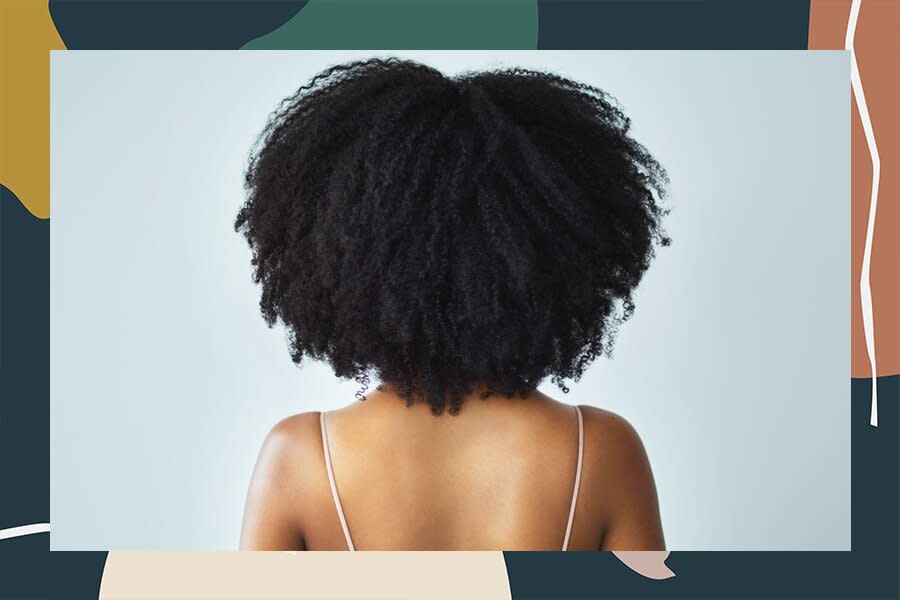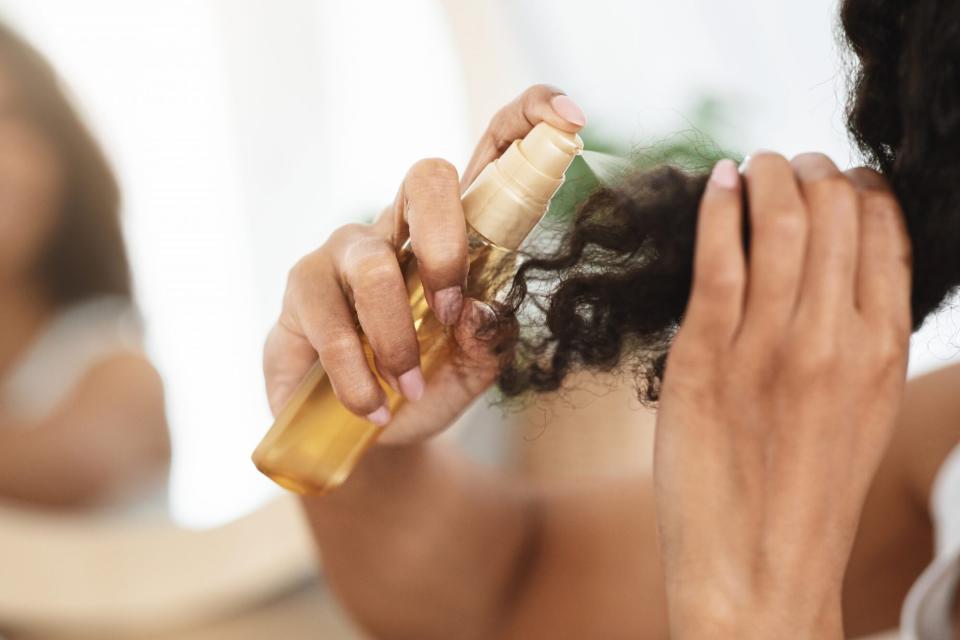As a Black Woman, White-Owned Hair Companies Bring a Muddied Pain

Getty Images
"Inclusivity" is a hot-button topic in the beauty industry, but to some it's just a clickbaity buzzword. Shades of Melanin unpacks some of the many untouched issues that Black women experience in the beauty community.
My hoard of haircare goodies are scattered across my kitchen counter, ready to be used. It's wash day, and I'm eager to see my new growth and excited to pamper myself. But this wash day feels different than usual because it's late June—during the civil unrest happening in honor of the unjust deaths of George Floyd and Breonna Taylor.
On this particular wash day, my Blackness is at the forefront of my mind. Looking at myself in the mirror, I feel an extra sense of pride in my natural hair and for the Black haircare brands I see in front of me. These products are meant for more than just hair—they are representative of people who get it. The presumably Black minds who came up with The Mane Choice's Three-in-One Leave-In Conditioner and Aunt Jackie's Don't Shrink Curling Gel understand me and the Black struggle, hair-wise and beyond.
So as I lean over the kitchen sink, cold water seeping through to my scalp, I say a little thank you to the Black founders who respect our experience and make it a priority, unlike the plethora of hair companies who have never made products with our hair types in mind. However, halfway through my protein treatment, I open Instagram to a post that pulls back the curtain on some of my favorite natural hair brands, and it shatters my illusions. It turns out that the beloved brands I just named (and many more) are not Black-owned.

Getty Images
After I did some more digging, I learned that many of the companies that are championed by Black people for creating products that prioritize our unique experience with hair do not primarily belong to a Black person. Some brands, like Carol's Daughter, were originally Black-founded and owned but were later sold to large, predominantly white corporations, while others, like Cantu, were entirely founded by white people. It is a stinging and complicated betrayal I was not expecting.
Existing as a Black person with natural hair can be exhausting. I remember the nights my mother spent struggling to tame my curls with combs and brushes that shouldn't have touched my hair in the first place. I remember the biting burn of the hot comb on my temple as I straightened my hair to look "presentable" for special occasions. I remember looking at all the white women on the television and not understanding why my hair didn't do what theirs did and deeply wishing that it did. I remember boys telling me they liked me but couldn't date me because they wanted their children to come out with "good hair."
After working through the insecurity I had built around my hair as a teen, I'd hoped that as an adult I could leave those hurtful conversations in the past. But instead they still sneak their way in through microaggressions and laws we're forced to obey about how we wear our hair.
Now, the criticism mostly comes in the form of passive-aggressive comments from non-Black people about our hair and how it looks—nice when it's straight, unprofessional when it's natural. Black women have to consider how our hair will be perceived in certain workplaces; after all, studies show that Black women feel more pressured to adhere to Eurocentric standards of straight hair and that others hold an implicit bias against natural hair. Earlier this year, Virginia became the fourth state to pass the Crown Act, which bans discrimination against natural hair in the workplace. But when children in South Africa are protesting discriminatory hair policies and teenagers are forced to cut off their locs for the sake of wrestling matches, it's impossible to argue that Black people are not paying a hefty cost because of the everlasting effects of racism.
Yet even in this small carved-out space of natural hair products that truly only exist for Black people, we still aren't in charge.

Getty Images
For companies such as Cantu and Doo Gro, both white-founded and white-owned, the buying choice as a Black person is clear: these products never deserved a spot on my shelf. To enter our homes under the guise of Blackness feels predatory to me. There is no need for that when there are Black-owned companies such as TGIN, Mielle Organics, Curls, Camille Rose, and Miss Jessie's that are doing the same thing but better. These brands come from within our community, so they understand our needs from an authentic perspective. Plus, it's important to support Black-owned brands financially by buying their products.
But as a Black consumer, things become more complicated when you consider buying from Black-founded brands like Shea Moisture, The Mane Choice, and Carol's Daughter, which are no longer Black-owned but once were. These companies were bought by larger corporations (Unilever, MAV Beauty Brands, and L'Oréal, respectively), allowing them to expand and reach a wider audience. Faced with online accusations of "selling out," these brands have had to explain their choices to consumers who felt betrayed by the buyouts.
Lisa Price, founder of Carol's Daughter, explained in the Netflix special She Did That (a documentary on Black female entrepreneurs) that her company needed help, which is why she sold it. Before being bought by L'Oréal in 2014, Carol's Daughter had filed for bankruptcy twice and was forced to shut down five of its stores. It was clear that the brand needed assistance, which it found under the L'Oréal umbrella. The sale also allowed it to create more products and reach more people.
And isn't that what we want? Don't we want to see the success of Black businesses and to have our needs met in the most convenient ways possible? To have Black people in rooms that have previously been inaccessible? If we're getting something we want, should it matter if we lose ownership in the process?
For me, it makes all the difference. Hair isn't just hair, because society doesn't allow it to be. Black people didn't place this scrutiny of our hair on ourselves, and we are the only party suffering from the psychological and professional wear and tear of existing the way we were made. The problem lies within a system that gatekeeps access from Black people to positions of power in these larger corporations. If Black people were able to reach these positions of power regularly, then perhaps Black-founded companies would be able to remain Black-owned and gain access to the capital they need to stay in business. Now, I'm not saying that all these founders were forced out of their companies and replaced by white people; I just wish they hadn't had to sell to see their brands succeed.

Getty Images
Today, less than one percent of Fortune 500 companies have Black CEOs, and while white families are continuing to see a growth in wealth, Black families have barely moved. If most of the wealth and positions of power in this country remain in the hands of white people, Black companies that need more money to sustain demand often won't have a choice other than to sell. Now, while many brands do have to sell, it's also important to note that some of them voluntarily sell when presented with the option to do so. For brands that do have to sell, it's demoralizing to see that their hard work comes at the cost of sharing their success with white people.
I want to see the success of Black-founded businesses. I want to see our natural hair products sold everywhere and in abundance, and I don't want to worry about whether there will be enough for all of us or not. I wish there was a way for the success we've built to stay and be shared within our community, but I also don't want to shame Black founders for selling their companies to larger brands. This system has always been in place, and its gatekeeping makes it nearly impossible for people of color to have success without also being of benefit to white people at the same time.
This isn't an issue relegated to natural hair companies only. As called out by Sharon Chuter's Pull Up for Change initiative, which asked beauty brands to disclose the number of Black employees in leadership positions, many brands that are built on Black consumers' dollars failed this internal examination. Revolution had only three percent of Black employees in its head office, Cover FX had four percent, and Morphe had three percent, for instance. African Americans spend nine times as much as our white counterparts on beauty, but this isn't reflected in these companies' employment. Black women are the majority buyers in beauty supply stores, but most of these stores are not Black-owned. It's a fine line to walk as a consumer who wants to see the success of Black-founded businesses but understands that we are often not sitting at the tables that reap the benefits. We shouldn't have to ask for seats at the table of natural hair, because that table wouldn't exist without us.

